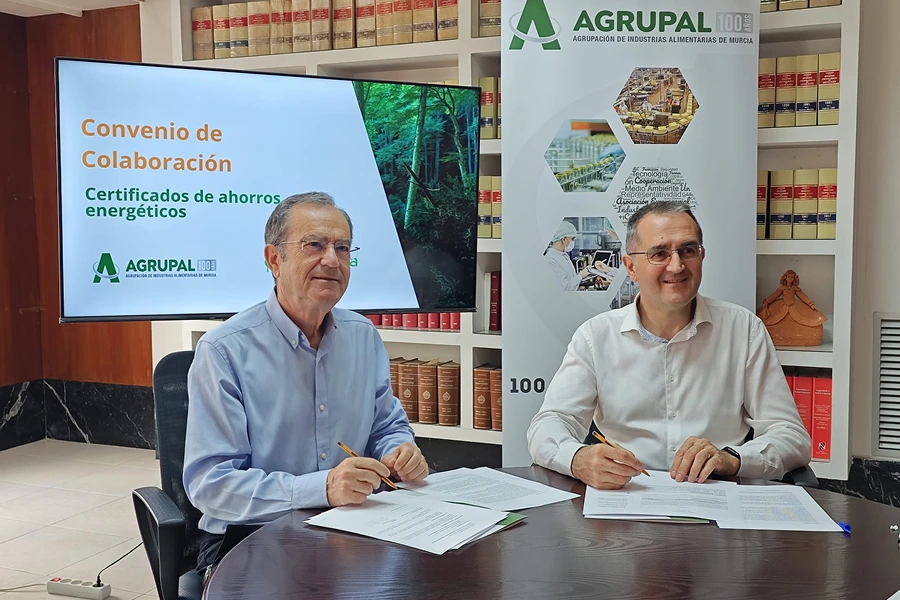Iberdrola España and Agrupal drive decarbonisation in Murcia through Energy Saving Certificates
- The achievement of Energy Saving Certificates (CAEs) will be promoted among members to improve the competitiveness of food industry businesses in the Region of Murcia
- This type of certification allows companies to monetise and recover part of the cost of energy efficiency investments

Signing of the agreement by Agrupal's president, José García Gómez, and Iberdrola España's Commercial Delegate in the Region of Murcia, Joaquín Longares
Iberdrola España and Agrupal, the Association of Food Industries of the Region of Murcia, have signed a collaboration agreement to enable the members of the business organisation to drive their decarbonisation and improve competitiveness through Energy Saving Certificates (CAEs).
The agreement, signed by Agrupal’s president, José García Gómez, and Iberdrola España’s Commercial Delegate in the Region of Murcia, Joaquín Longares, will allow members of the food industry association to promote the achievement of CAEs, enabling them to monetise and recover part of the cost of their energy efficiency investments.
For Joaquín Longares, the essence of the Energy Saving Certificates system “is that companies save on energy consumption, thanks to the use of aerothermal energy, electrification of ovens, heat recovery, monitoring and savings systems, or equipment renewal, and, in addition, receive an additional income for it, which further improves the profitability of these investments and increases the competitiveness of the companies while contributing to environmental protection.”
José García, for his part, highlighted that with this agreement “Agrupal’s companies are offered a comprehensive solution for the certification of savings, with advantageous technical and economic conditions. In this collaboration with Iberdrola España, our companies will have specialised technical support throughout the entire certification process, channelled through Agrupal, ensuring the maximum feasibility of energy consumption reduction projects.”
This push for decarbonisation is a simple and cost-effective alternative for clients, as it proposes that SMEs, businesses, and industries carry out energy efficiency measures with direct and automatic discounts on the same bill.
One of the advantages of the Energy Saving Certificates is that clients can receive the money in a short period of time, in contrast to traditional grants and subsidies. The amount, known in advance, varies depending on the total investment of the project, and savings of up to 70% are possible in a boiler replacement project from gas to heat pump, when including existing tax deductions.
Electrification of industrial processes
This agreement adds to the one signed by both entities at the end of the previous year to explore opportunities for driving the decarbonisation of the food industry sector through electrification and move towards a more efficient and sustainable future.
A significant portion of the energy needs in the food industry comes from so-called industrial heat, required for a wide range of processes. Additionally, due to its variety of applications, industrial heat often requires different temperature levels and amounts of heat depending on the specific needs of each process.
Historically, fossil fuels such as natural gas, oil, and coal have been used to generate this heat in industrial boilers and ovens. However, the growing interest in sustainability and the desire to reduce greenhouse gas emissions are pushing the industry to increasingly seek renewable and more energy-efficient heat sources. Therefore, decarbonising industry through electrification is crucial for advancing the fight against climate change.
Energy Saving Certificates will provide a boost for the decarbonisation of food industry companies in the Region by offering an economic incentive, which leads to savings and, consequently, greater competitiveness, while contributing to the sustainability of the sector.




